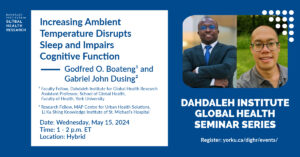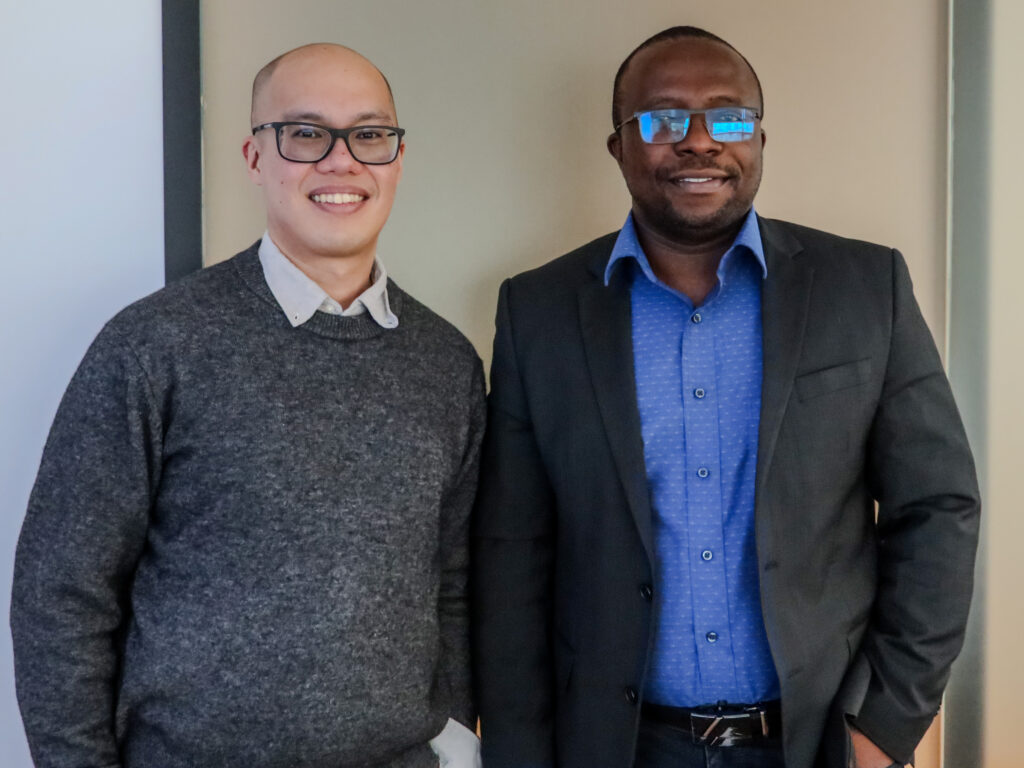Post
Published on July 5, 2024

What is the relationship between sleep, our ability to think clearly, and climate change?
This was the question that Dahdaleh faculty fellow Professor Godfred Boateng and Dr. Gabriel John Dusing, who is a Research Fellow, MAP Centre for Urban Health Solutions, sought to answer in their seminar at the Dahdaleh Global Health Institute on May 15, 2024.
Professor Boateng and Dr. Dusing provided an in-depth overview of sleep disorders and cognitive decline – our ability to learn, remember and reason -- in sub-Saharan Africa, explaining the links to climate change. Their research highlights the growing health burdens posed by climate change, focusing on temperature-related illnesses and deaths, air pollution, and wildfire risks. They explained how these hazards impact individuals across different age groups, from infancy to older age.
Climate change has a staggering health burden, Professor Boateng observed. Climate hazards such as heatwaves, droughts, and wildfires are all increasing in frequency and severity. These events pose significant challenges to human resilience and adaptive capacity. Infants, children, older adults, and those with compromised immune systems or cardiovascular diseases are especially vulnerable.
Professor Boateng reminded listeners that 2023 was the warmest year recorded since 1850. Temperatures averaged 1.18 degrees Celsius above the 20th-century norm. Extreme temperatures, particularly those above 35 degrees Celsius, have direct and indirect negative health effects, for instance, heat strokes and cardiovascular issues.
Focusing on sub-Saharan Africa, Professor Boateng noted that the region is currently experiencing unprecedented heat, with nighttime temperatures rising significantly. The World Meteorological Organization’s 2022 State of the Climate in Africa report indicates an accelerated rate of temperature increase, exacerbating weather and climate-related hazards. The health impacts are severe for African countries – yet most existing studies are concentrated in high-income countries and parts of Asia.
Professor Boateng emphasized the need to understand how rising temperatures impact sleep quality and cognitive function among older adults in the African region.
Dr. Dusing explained their research using two primary data sources: climate data from the University of East Anglia's Climate Research Unit and survey data from the World Health Organization's Study on Global Aging and Adult Health (SAGE).
The climate data provided an in-depth overview of temperature changes over time, while the SAGE survey offered insights into sleep quality and cognitive function among older adults.
The researchers sought to understand possible links between increased ambient temperatures, reduced sleep quality, and increased cognitive impairment.
Sleep quality was assessed through survey responses that measured /difficulty falling asleep, staying asleep, and feeling rested upon waking. Cognitive function was measured using verbal recall tests (immediate and delayed), which ask study participants to remember different words, and digit span tests (forward and backward), which ask study participants to remember numbers. These tests provided a score reflecting cognitive function.
The study confirmed three relationships. First, for each degree increase in temperature, there was a significant rise in reported sleep difficulties, even after adjusting for various control variables. Second, increased ambient temperature correlated with a decrease in cognitive scores, indicating higher cognitive impairment risks. Last, poor sleep quality mediated the relationship between higher temperatures and cognitive decline.
Professor Boateng noted that those above the age of 65 years reported more significant sleep challenges and lower cognitive scores compared to younger individuals. For each degree rise in temperature, there was a 23% increase in reported sleep problems and a 2% decrease in cognitive scores. These effects were even more pronounced among those over the age of 65, indicating that older adults are particularly vulnerable to the health impacts of climate change. The study underscored the urgent need for policies addressing the health impacts of climate change on older adults. Such policies should prioritize improving health assessments and resource security for older adults, particularly in informal settlements and residential areas where the health risks are higher.

Overall, Professor Boateng and Dr. Dusing provided valuable insights into the relationship between climate change, sleep quality, and cognitive function in sub-Saharan Africa.
Professor Boateng noted that current climate mitigation and adaptation policies have not significantly reduced world temperatures. This problem is likely to worsen over the next decade due to a laissez-faire approach to climate mitigation and adaptive practices. This will negatively affect the aging population in many African countries.
It is important to create comprehensive measures targeting resource security for older adults, Professor Boateng and Dr. Dusing emphasized, when monitoring progress made in climate mitigation and adaptation. Policies should respond to the immediate health impacts of climate change but they must also consider long-term strategies for adaptation and resilience. By prioritizing the specific vulnerabilities of older adults to climate change, policymakers can help mitigate adverse effects and improve overall health outcomes.
Climate change poses many health challenges. Among them, increased temperatures harm sleep quality and so our ability to think clearly. This is especially true for older adults. We need interdisciplinary research and targeted policy measures to ensure that older adults in sub-Saharan Africa are given the support that they need, as we face this climate change challenge.
Connect with Dr. Gabriel John Dusing and Professor Godfred Boateng
Themes | Global Health & Humanitarianism |
Status | Active |
Related Work | |
Updates |
N/A
|
People |
Godfred Boateng, Faculty Fellow, Faculty of Health - Active
Gabriel John Dusing, Research Fellow, Global Environmental Lab - Alum |
You may also be interested in...
Recap – Individual Agency in the Prevention and Control of Noncommunicable Diseases
In this November 9, 2022, Arun Chockalingam, professor and Dahdaleh senior fellow, analyzed the correlation between planetary health and human health. Noncommunicable Diseases (NCDs) on the rise since the mid 1900s. Professor Chockalingam advised that ...Read more about this Post
Recap — Graduate Student-led Research on Probabilistic Modelling with Machine Learning for Safe Water Optimization
On September 7, 2022, Dahdaleh graduate student fellow in the Lassonde School of Engineering, Michael De Santi presented his work analyzing the technical aspects of machine learning used in the Safe Water Optimization Tool (SWOT) ...Read more about this Post
Recap – Innovative Approaches to Target HPV-Vaccine Accessibility and Cervical Cancer in Sub-Saharan Africa
On November 22, 2023, Dahdaleh graduate scholar Eric Asempah addressed the urgent global health issue of preventing human papillomavirus infection (HPV) related cervical cancer through prophylactic vaccines in low and middle-income countries. Cervical cancer claims ...Read more about this Post


